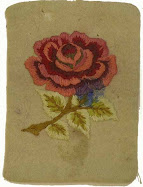In light of the title of this blog I really feel I should write a few words about Ronnie Poulton and the influence his life has had on my own. Other than the great game of rugby Ronnie and I have no connection, I am not related in anyway, tenuous or otherwise. However, his story has impacted me on many occasions and I find myself in that strangest of situations asking myself 'what would Ronnie have done?'.
Anyway, his story is well known and I will not go into the details of it at length. I will only say that he has had a profound influence on my interest in rugby history, particularly that related to The Great War.
I am currently reading a biography called 'Half Time' by H.B.T. Wakelam. Written in 1938, it covers his pre-war experiences at Marlborough, Cambridge and the army during the war. It goes on, in the second part, to describe his pioneering role as a sports commentator for the BBC.
Throughout this book I have been struck by the candidness with which Wakelam lays his emotions before the reader. He frequently refers to the great loss of friends he sustained through the war with references to the pictures hanging in his study and how just the thought of those days catches him in the throat. For a man who comes across as rather quintessentially stiff-upper-lipped his openness when discussing his fallen friends is at such a juxtaposition to the rest of the text it impacts the reader that much more.
It has made me think further about all the black and white or sepia toned pre-war photographs of teams who would be broken up in one way or another by the war. How many men and women had a similar gut wrenching feeling upon walking into a study full with photographs of school, college and amateur XVs.
As if the reminder of photographs was not enough, for those fit enough to return to the sport after the war must have found great difficulty returning to their clubs and entering into changing rooms filled with fresh faces. In Frederic Humbert's splendid blog rugby pioneers he refers to the fact that 11 of the players involved in the last test match before the war did not return. Perhaps more revealing is the team sheet from England's first test match after the war; eleven of the XV were new caps.
It has been noted that there was, unsurprisingly, a lack of cohesion in the team that were defeated by Wales that January afternoon in 1920. Cyril Lowe, who was the only remaining element of the pre-war English three-quarters, did not score but was the only solid defender. How he must have longed for that 1914 back line.
Saturday 27 February 2010
Subscribe to:
Posts (Atom)
